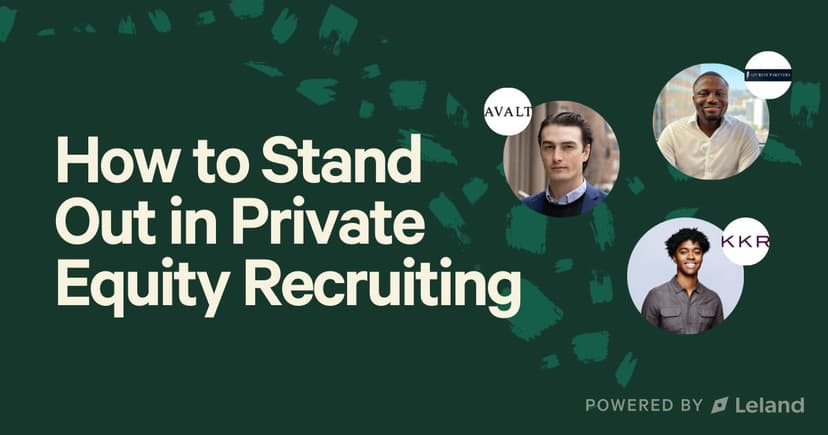Blackstone Pymetrics: Interview Questions & Tips (2026)
Get tips for acing the Blackstone Pymetrics interview—understand how the games work, what traits they assess, and how top candidates stand out.
Posted January 22, 2026

Join a free event
Learn from top coaches and industry experts in live, interactive sessions you can join for free.
Table of Contents
“I thought I bombed the Balloon Game… but still got a final round.” If you’ve read the Reddit threads, you know the Blackstone Pymetrics interview is unlike anything you’ve done before, and even strong candidates walk away unsure how they performed. The good news? You can prepare, just not in the way you might think.
This guide explains what the Pymetrics games actually measure, how they’re used in Blackstone’s hiring process, and what traits successful candidates tend to share. You’ll also get expert tips, a breakdown of each game, and real-world insights to help you navigate the assessment with clarity and confidence.
What Is the Blackstone Pymetrics Interview?
Pymetrics is an online assessment tool that uses neuroscience-based games and behavioral science to evaluate candidates. Rather than asking traditional questions, it measures traits like focus, risk tolerance, memory, and fairness—all through quick, intuitive tasks.
Blackstone incorporates Pymetrics early in its recruiting process. After your resume is screened, you’ll be invited to complete the Pymetrics test, typically before HireVue or other video interviews. It's the first stage in what can become a two-stage assessment process, where behavioral and cognitive data inform your candidacy.
Why does Blackstone use it? As a very lucrative employer with a large candidate pool, they rely on Pymetrics to identify top behavioral traits aligned with the firm’s high-performing analysts without bias. This screening process helps them efficiently and fairly narrow down who moves forward.
What Types of Games Are in the Blackstone Pymetrics Test?
The Blackstone Pymetrics assessment includes 12 AI-based games, each designed to assess specific cognitive, emotional, and social traits. The games adapt in real time to your performance, which means there are no right or wrong answers—but understanding what each game measures can help you bring your best.
Here's a breakdown of some of the key games:
| Game | Primary Trait(s) Measured | Time Limit | What It Tests / Interprets |
|---|---|---|---|
| Balloon Game | Risk Tolerance | ~3 min | Willingness to take calculated risks under uncertainty |
| Tower Game | Planning, Strategic Thinking | ~3 min | Ability to plan ahead, problem-solve, and stay organized |
| Money Exchange Game | Generosity, Fairness, Reciprocity | ~3 min | Approach to cooperation and equitable decision-making |
| Arrows Game | Attention, Cognitive Control | ~2 min | Focus, reaction time, and adaptability to shifting rules |
| Digits Memory Game | Working Memory, Recall | ~2 min | Short-term memory retention and recall accuracy |
| Cards Game | Learning from Feedback, Risk Aversion | ~2–3 min | How well you adjust your behavior based on positive/negative outcomes |
| Faces Game | Emotional Recognition, Empathy | ~2 min | Ability to recognize emotions and interpret social cues |
| Stop Game | Impulse Control, Patience | ~2 min | Inhibitory control—how well you manage reactive behavior |
| Lengths Game | Estimation, Perceptual Accuracy | ~2 min | Precision in spatial judgments and visual comparisons |
| Keypress Game | Sustained Attention, Consistency | ~1–2 min | Endurance of focus and coordination over repetitive actions |
These Pymetrics games measure far more than reaction speed—they reflect how you think, decide, and adapt. The Pymetrics test assesses traits crucial to roles in the finance industry, especially in high-stakes environments like private equity.
Blackstone Pymetrics Interview Questions
While the Pymetrics assessment is game-based, it’s often followed by pre-recorded interview questions, typically via HireVue. These questions are designed to complement the data gathered from your Pymetrics games and provide deeper insight into how you think, communicate, and solve problems.
Important note: Blackstone isn’t looking for rehearsed, robotic answers. They want to see clear thinking, ethical reasoning, and alignment with how successful analysts operate under pressure.
Describe a time when you had to make a difficult decision. (Decision-Making)
How to answer it: Use the STAR method to walk through your logic, not just the outcome. Focus on trade-offs, long-term thinking, and who was impacted.
Example of a strong answer fragment:
“I was torn between a low-risk investment with modest returns and a higher-growth option with reputational exposure. After weighing risk tolerance and alignment with our firm’s strategy, I proposed a hedged position to mitigate downside risk while keeping upside optionality.”
Why it works:
- It shows structured decision-making
- Demonstrates awareness of stakeholder impact
- Highlights risk/reward judgment, aligning with games like the Balloon Game and Cards Game
Why do you want to work at Blackstone? (Motivation & Firm Fit)
How to answer it: Tie your answer to real research—specific teams, strategies, or culture. Show that you understand Blackstone’s business and values.
Example of a strong answer fragment:
“I’m especially drawn to Blackstone’s Real Estate team and how it identified opportunity in logistics post-COVID, combining deep market insight with long-term vision.”
Why it works:
- Demonstrates firm-specific motivation
- Reflects strategic thinking, not vague admiration
- Aligns with traits like focus and goal orientation, which Pymetrics tracks
How would you assess the risk in a potential investment? (Risk Analysis)
How to answer it: Walk through clear categories—market, credit, operational, etc. Show that you’re analytical and structured.
Example of a strong answer fragment:
“I’d start by stress-testing cash flows under different macro scenarios—then evaluate credit risk and industry cyclicality before considering internal execution risks.”
Why it works:
- Mirrors how analysts actually evaluate risk
- Shows you think multidimensionally
- Reinforces traits like planning and risk tolerance tested by Pymetrics
Tell me about a time you faced an ethical dilemma. (Integrity & Judgment)
How to answer it: Pick a gray-area scenario and walk through your ethical reasoning. Blackstone is looking for long-term judgment, not just compliance.
Example of a strong answer fragment:
“I flagged the deal despite short-term upside—it didn’t align with our ESG policy or the client’s mandate.”
Why it works:
- Shows values-driven decision-making
- Reinforces traits like fairness, generosity, and impulse control
- Aligns with Pymetrics and Blackstone’s emphasis on integrity
How do you prioritize tasks when working on multiple projects? (Time Management)
How to answer it: Talk about how triage works based on urgency, impact, and deadlines. Mention tools or systems you use.
Example of a strong answer fragment:
“I use time-blocking and flag high-impact deliverables first, then group similar tasks to reduce context-switching.”
Why it works:
- Signals self-awareness and execution skill
- Matches traits like focus and attention, seen in games like the Keypress Game and Arrows Game
Tell me about a time you worked on a team to achieve a goal. (Collaboration)
How to answer it: Emphasize your role, how you supported others, and what made the team effective.
Example of a strong answer fragment:
“I stepped in to fill a gap when a teammate dropped out—restructured the deck to distribute workload evenly and keep us on deadline.”
Why it works:
- Highlights proactivity and flexibility
- Reinforces interpersonal traits like cooperation, fairness, and empathy
Want expert help passing the Blackstone Pymetrics interview?
Work 1-on-1 with former Blackstone professionals who know exactly how the assessment works and how candidates can stand out.
- Michael P: Former Analyst at Blackstone, HBS MBA, Principal & Hiring Manager at Warburg Pincus
- Kenny J: Former Associate at Blackstone, Investor at KKR
- Lucy S: Former Senior Associate at Blackstone, Harvard MBA/MPA, Energy Expert & Engineer
How do you keep up with current economic and financial news? (Market Awareness)
How to answer it: Share the tools, publications, or habits that keep you current. Bonus points for showing curiosity and initiative.
Example of a strong answer fragment:
“Each morning, I skim The Journal, scroll Bloomberg’s homepage, and keep an internal Slack thread with weekly market themes for my peers.”
Why it works:
- Demonstrates industry engagement
- Shows initiative beyond the bare minimum
- Reflects focus and interest in the finance industry
Give an example of a project where you used data to make a decision. (Analytical Thinking)
How to answer it: Briefly describe the problem, what data you used, and how it led to a recommendation.
Example of a strong answer fragment:
“We noticed churn in one segment. I ran a regression on usage data, found a pricing threshold tied to drop-offs, and proposed a new tier structure.”
Why it works:
- Shows quantitative fluency
- Links analysis to actionable insight, not just observation
- Aligns with roles requiring strong data-driven decisions
How would you explain a complex financial concept in simple terms? (Communication)
How to answer it: Pick a real concept (e.g. hedging, EBITDA, IRR) and explain it like you would to a smart but non-finance friend.
Example of a strong answer fragment:
“EBITDA is like a company’s paycheck before it pays rent, interest, or taxes—it shows pure operating cash flow.”
Why it works:
- Demonstrates clarity, not just technical knowledge
- Blackstone values people who can simplify complexity—especially in client-facing roles
Important Traits to Stand Out in Pymetrics
Based on Reddit threads and behavioral science, the traits that stand out to Blackstone include:
- Focus – Key in time-limited games like the keypress game or the digits memory game
- Risk Tolerance – Measured through the balloon game, it’s not about being reckless, but calculated
- Fairness & Generosity – Games like the money exchange game and faces game reveal how you interact with others
- Impulse Control – Important in the stop game and tower game
- Planning & Strategy – Central in the tower game, reflecting the mindset of a high-performing analyst
Unlike traditional interviews, Pymetrics aims to map your decisions to neuroscience-backed traits. The sophisticated AI algorithm operates in the background to create a profile that recruiters compare with successful hires.
You can’t “fake” these games, but you can understand what’s being tested—and how to bring your best self.
How to Prepare for the Blackstone Pymetrics Interview
Can You Actually Prepare for Pymetrics?
Yes—and no. You can’t “study” for the Blackstone Pymetrics assessment the way you might for a case interview or technical screen. The games adapt in real time and are built to measure instinctive behaviors, not learned strategies.
But what you can control is your performance environment, mental readiness, and ability to stay focused under pressure. Think of it less like a test and more like a snapshot of your cognitive and emotional wiring at a given moment.
Expert Insight: Pymetrics was designed to resist manipulation, but you can still optimize how you show up. The difference between an average result and a standout one often comes down to mindset, energy, and awareness.
Tactical Preparation Strategies That Actually Work
These aren’t gimmicks—they’re performance enhancers grounded in behavioral science:
- Sleep is your best prep. Fatigue degrades executive function, emotional regulation, and working memory—traits that Pymetrics games are designed to measure. Aim for 7–9 hours the night before.
- Train your cognitive reflexes. Use apps like Lumosity, Peak, or NeuroNation to warm up your short-term memory, pattern recognition, and reaction speed. Even a week of light daily use can sharpen attention.
- Simulate real test conditions. Take a 25-minute block in a quiet room, full screen, phone away. No breaks. This helps regulate your stress response and improves focus during the actual session.
- Don’t try to “game” the games. Pymetrics algorithms adjust difficulty based on your responses. Overthinking can backfire. Your instinctive behaviors—how you handle uncertainty, delay gratification, take calculated risks—are what the test is capturing.
- Pay close attention to instructions. Each game has slightly different rules. Rushing through them is one of the most common mistakes. Missing a single detail can impact how your behavior is interpreted.
- Warm up beforehand, but avoid burnout. A short walk, light breathwork, or 5 minutes of mindfulness can reduce anxiety and improve cognitive flexibility—ideal prep for decision-heavy games like Balloon, Cards, and Tower.
Which Prep Tools Are Actually Worth It?
The truth? Most “Pymetrics practice tests” online don’t reflect how the actual games work. Pymetrics is powered by a sophisticated AI algorithm that adapts in real time based on your behavior. That means the games aren’t fixed, and your performance isn’t judged by raw scores, but by how you react in specific behavioral contexts (e.g. delayed gratification, adaptability, learning from feedback).
So, when it comes to Blackstone Pymetrics assessment prep, the goal isn’t to memorize game patterns. It’s to train the underlying traits the games measure, like attention, impulse control, risk tolerance, and cognitive flexibility.
- Best free alternatives: Use reaction time apps, dual n-back training, and decision-making games to build foundational traits like attention, memory, and impulse control. These won’t replicate the games—but they’ll boost underlying cognitive functions.
- JobTestPrep and similar tools: Useful for exposure, but often feel clunky and unrelated. Their value lies more in reducing surprise than in skill-building.
- The only accurate prep? Self-awareness. The better you understand how you handle pressure, multitasking, or ambiguity, the better you'll perform. Here’s what separates shallow prep from strategic prep:
| Before | After |
|---|---|
| Memorizing game sequences | Building cognitive endurance |
| Practicing for raw speed only | Practicing for focus and consistency |
| Guessing what Blackstone wants | Knowing how you handle pressure |
| Relying on canned practice tests | Training traits with neuroscience-backed tools |
Why it matters: Pymetrics captures how you behave under pressure—not how well you rehearsed. The more self-aware and mentally prepared you are, the more accurately your strengths will come through.
When Should You Take the Assessment?
Timing is one of the most underrated factors in Pymetrics performance. Aim to take the test in the morning, when your cognitive function is at its peak and distractions are minimal. Block off time before and after so you're not rushing in or mentally drained from another commitment; lingering stress or divided focus can affect reaction time, impulse control, and attention, all of which are directly measured. Set yourself up like it’s a high-stakes exam: strong Wi-Fi, good lighting, complete silence, and zero interruptions. Even seemingly simple games, like those triggered by the space key, can misread your behavior if your environment is chaotic.
Pro tip: Treat your testing window like a game-day performance. Pymetrics doesn’t just measure what you do—it captures how you show up.
Expert Tips to Stand Out in the Blackstone Process
If the Pymetrics assessment left you unsure how you did, you’re not alone. Here’s what real candidates say:
“I thought I bombed the Balloon Game, but still got a final round. Don’t overthink it.”
“The two nearly identical image games were weird, but just be consistent.”
“It’s just games. Don’t panic if one feels off.”
These stories aren’t just comforting; they highlight a critical insight: success on the Pymetrics test isn’t about being perfect. It’s about showing consistent behavioral patterns that align with how top-performing Blackstone analysts operate. A single mistake or confusing game won’t disqualify you.
What Blackstone Actually Looks For
Recruiters and insiders confirm that Pymetrics is only one part of the broader evaluation process. Think of it as an early behavioral screen, not a final decision-maker. If your profile reflects traits like focus, ethical judgment, risk calibration, and decision-making under pressure, and your story holds up in later rounds, you can still advance even if a few games felt shaky.
How to Actually Stand Out
- Stay consistent across rounds. Your interview answers should reinforce the behavioral signals from your Pymetrics data (e.g. thoughtful risk-taking, fairness, perseverance).
- Don’t fake your gameplay. Trying to “optimize” your behavior often leads to inconsistency, which is a red flag.
- Use the games as insight, not judgment. If you find yourself reacting impulsively or rushing, reflect on what that says about how you perform under pressure. Self-awareness helps you grow, regardless of outcome.
Expert POV: Blackstone is less interested in “perfect” candidates—and more interested in those who show signs of long-term potential. They care about how you think, adapt, and respond under pressure, not just your resume or GPA.
For a full breakdown of the next steps, read How to Ace Your Blackstone Interview | Leland.
Ready to Take Your Interview to the Next Level?
Blackstone is one of the most competitive firms in the consulting and finance industries—but the right preparation can set you apart. Whether you’re navigating Pymetrics interview questions or prepping for final rounds, our expert Private Equity coaches can help you tailor your approach and maximize your shot at the dream job. Browse PE coaches here.
See: The 10 Best Private Equity Career Coaches for Interview Prep & Training
Read these next:
- How to Answer the "Why Blackstone?" Interview Question (Tips & Examples)
- 50+ Most Common PE Interview Questions & Answers (Behavioral/Technical)
- The 10 Best Questions to Ask Your Interviewer in a Private Equity Interview
- Top Private Equity Internship Programs (and How to Stand Out)
- Finance Internships for College & High School Students
- Intro to Financial Modeling – With Examples
- The Best Venture Capital & Private Equity Newsletters and Podcasts
FAQs
Can you prepare for the Blackstone Pymetrics assessment?
- Yes, through focus training, mock tests, and learning what each game measures. But you can’t “game” the system—stay sharp, calm, and authentic.
Does Blackstone reject candidates based on Pymetrics results?
- Sometimes. But scores are reviewed alongside resumes and interviews—it’s one part of a bigger picture.
What’s the best way to perform well on the Blackstone Pymetrics games?
- Know what each game tests (see our table), simulate test conditions, and manage stress.
Why does Blackstone use Pymetrics in its hiring process?
- To fairly evaluate candidates’ cognitive and social traits using a sophisticated AI algorithm, and to reduce unconscious bias.
How important is the Pymetrics test compared to the rest of the interview process?
- It matters, but it won’t make or break you alone. It’s used to spot traits aligned with the role.
Is the Blackstone Pymetrics interview the same as other firms’ versions?
- Mostly, but Blackstone’s Pymetrics assessment may emphasize traits like ethical decision-making and long-term planning more heavily than firms like BCG or JPM.
























